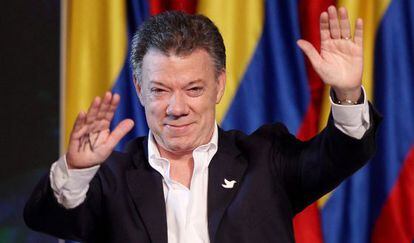Colombia’s Santos wins re-election with peace message
Incumbent receives nearly 51 percent of votes compared with 45 percent for challenger Zuluaga


Colombian President Juan Manuel Santos on Sunday garnered enough support to win re-election and resume his peace talks with the Revolutionary Armed Forces of Colombia (FARC) guerrillas, an issue that had become the cornerstone of this presidential campaign.
Santos, 63, obtained 50.9 percent of the vote compared with his main challenger, Oscar Iván Zuluaga, who received 45-percent support for his tough talk against concessions for the guerrillas.
The result of the runoff ensures continuity for negotiations that began in Havana in November 2012 and have been the subject of heated debate in Colombia.
“History has its moments, and this is the moment to end this bloody conflict,” said an elated Santos in a victory speech as his family looked on. “Today’s message also goes out to the FARC and the ELN [the second largest guerrilla group in the country]. This is the end. It is the end of 50 years of violence.”
I am not voting for any of them. This has been their own private battle” Gloria Roa
Then, after warning that the road ahead would not be easy, Santos sought to soothe those voters who worry his negotiations will result in privileges for the guerrilla group, such as an amnesty and seats in Congress. “There will not be peace with impunity. There will be a just peace.”
This was one of the most confrontational campaigns in recent history, with a series of scandals emerging against both candidates.
The main challenger, Oscar Iván Zuluaga – a follower of charismatic ex-president Álvaro Uribe – had won the first round of voting after accusing Santos of selling the country out to the guerrillas and promising them political participation if they laid down their weapons. Zuluaga said certain conditions had to be met, including getting the FARC to stop recruiting children and carrying out attacks, before he would head back to the negotiating table.
There was a high abstention rate of 53 percent, although it was lower than the 60 percent in the first round of voting on May 25.
Gloria Roa, 53, and her daughter Diana Tipazoc, 22, who live in a middle-class neighborhood in Bogota, came out so the latter could vote for Santos.
“I have seen the televised debates and I think we need to try to end the war. That is why I am going with Santos,” said Tipazoc.
But her mother chose to abstain. “I am not voting for any of them. This has been their own private battle, and they are not concerned about crime; there is no good education, there is still a lot of poverty,” said Roa.
I am afraid of Santos winning; he is giving too much to the FARC in exchange for nothing” Diana Bautista, physician
Diana Bautista, a 26-year-old physician, said she voted for Zuluaga out of fear that the guerrillas were getting too good a deal.
“I am afraid of Santos winning; he is giving too much to the FARC in exchange for nothing. They are still killing, stealing and extorting money from people,” she said, adding that in these last four years the government has barely done anything for public healthcare, which she described as “terrible.”
Santos may be able to show off successful macroeconomic figures – 4.3 percent growth, 2.5 million people lifted out of poverty, a declining jobless rate that is now at 9.6 percent – yet Colombia still has some of the highest inequality levels in the world. And many people accuse politicians of being an elite who are out of touch with people’s real problems.
Ana Jennifer Gómez dragged her four kids along to the polling station, where she said she would vote for Zuluaga. “My children have just come to live with me in Bogota. I was displaced from the area of Caquetá by the FARC. My children stayed with their grandmother while I worked here and sent them money,” she explains. For this woman who works 12 hours a day at a sewing workshop, peace remains a faraway concept. “I know what war is like, and I know what the countryside is like. Politicians only want power, no help ever reaches out there.”










































